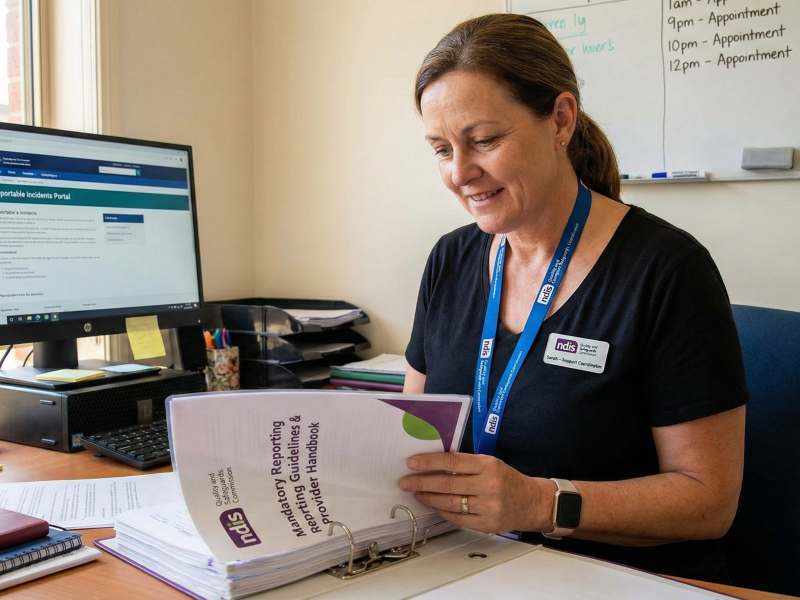An Unregistered Provider delivers supports and services to National Disability Insurance Scheme (NDIS) Participants, but is not formally Registered with the NDIS Quality and Safeguards Commission (Commission).
Unregistered Providers can work with self-managed or plan-managed NDIS Participants, however are unable to serve Participants whose plans are handled directly by the National Disability Insurance Agency (NDIA). There are also some supports and services which are reserved for Registered NDIS Providers, including SDA and Plan Management.
Being Unregistered:
- indicates that the Provider has not attempted the Provider Registration process, which involves fulfilling certain quality and safety requirements, undergoing auditing, and receiving approval from the Commission.
- This implies that the Provider is wholly responsible for ensuring that they comply with the required service delivery standards.
- may give Provider businesses more freedom and independence in early stages.
Difference Between Registered and Unregistered Providers
The main difference between Unregistered and Registered NDIS Providers is how they are engaged with the Commission and NDIS Participants.
Registered Providers:
- Have gone through formal Registration with the NDIS Commission.
- May provide services to any NDIS Participant, including NDIA-managed and plan Participants.
- Are subject to stringent quality and safety requirements, such as ongoing audits and monitoring.
- Are listed on the NDIS Provider register, increasing their visibility to Participants.
Unregistered Providers:
- Have not been through the NDIS Commission’s Registration process.
- Are only able to provide services to self-managed or plan-managed Participants.
- Are subject little oversight, but are still required to uphold the NDIS Code of Conduct.
The decision to be a Registered Provider or an Unregistered Provider relies on the type of services provided, the target market, and the ability of the Provider to comply with the regulatory demands.
Want to Attract More NDIS Clients?
Get expert advice on how to market your services, connect with clients, and grow your practice.
Pros and Cons of Being an Unregistered NDIS Provider
Pros:
- Lower Entry Barriers: Since formal Registration is avoided, there is less initial cost and administrative hassle for new Provider businesses.
- Flexibility: Unregistered Providers have more freedom in determining service arrangements and charging structures.
- Faster Market Entry: Since audits and compliance checks are not required, Unregistered Providers can enter the market sooner.
Cons:
- Limited Client Base: The services can be provided only to self-managed or plan-managed Participants and not to those with NDIA-managed plans.
- Reduced Visibility: Not being listed on the official NDIS Provider Finder tool might make it more difficult for Participants to locate and trust the Unregistered Provider.
- Self-Regulation: Without independent audits, the Unregistered Provider has full responsibility for ensuring quality and safety standards. This may put the business at risk if they don’t understand their Provider obligations.
- Risk of Future Regulation: There is an ongoing industry debate regarding greater regulation of Unregistered Providers, which may lead to unforeseen financial and compliance obligations if mandatory Registration is implemented.
Balancing these factors is important for Providers who are thinking about the Unregistered route. Since the cons of an Unregistered NDIS Provider outweighs the pros, it is best to consider the Registration option. To know more or get assistance to become a Registered NDIS Provider you can get in touch with Avaana.
Major Responsibilities of Unregistered Providers
Though not formally Registered by the Commission, Unregistered NDIS Providers do have Participant service delivery requirements:
- Compliance with the Code of Conduct for the NDIS: Unregistered Providers must deliver all services ethically and safely.
- Participant Safety: Unregistered Providers must have safeguards in place to ensure Participants are not harmed during service delivery, including to address situations promptly if an incident occurs.
- Record Keeping: Unregistered Providers must keep proper service provision and financial records.
- Continuous Improvement: Unregistered Providers continuously improve their services to ensure support are Participant-centred.
Compliance with these duties enables credibility and trust to be established with Participants and their support systems.
Payment and Funding for Unregistered Providers
Unregistered NDIS Providers are not eligible to be paid through the NDIS portal, and instead issue invoices for services and supports provided.
Self-Managed Participants:
- Participants pay the Provider directly and are reimbursed by the NDIS.
Plan-Managed Participants:
- The Provider bills the Participant’s plan manager, who makes payment.
Invoicing Requirements:
- List the Provider’s ABN, contact information, and invoice number.
- Clearly provide the Participant’s name, NDIS number, and description of the services delivered.
- State dates of service delivery and total charge.
Invoicing in a timely and accurate manner is important to facilitate timely payment and trust with clients and plan managers.
Process to Become an Unregistered NDIS Provider
Becoming an Unregistered NDIS Provider entails the following important steps:
Set up a Business:
- Select a suitable business structure (e.g., company, partnership, sole trader).
- Register for an Australian Business Number (ABN).
Understand NDIS Requirements:
- Familiarise yourself with the NDIS Code of Conduct and make sure that your services meet its principles.
- Keep yourself updated about any changes in NDIS service delivery standards which can impact Unregistered Providers.
Get Necessary Insurance:
- Purchase public liability insurance and professional indemnity insurance to cover against possible claims.
Establish Service Agreements:
- Establish clear service agreements that detail the services offered, charges, cancellation procedures, and resolution of disputes.
Establish Record-Keeping Systems:
- Install systems for keeping proper records of services rendered, invoices sent out, and payments received.
Market Your Services:
- Market your services appropriately to reach plan-managed and self-managed Participants.
- Network with support coordinators and plan managers to generate referrals.
By doing this, you can become a legitimate Unregistered NDIS Provider.
Referrals Start With Reputation – We’ll Help You Build Both
From networking tips to service refinement, we guide NDIS providers toward lasting impact.
FAQs
Q1. Can I provide all NDIS services as an Unregistered Provider?
No. Unregistered Providers cannot provide specific services, including Specialist Disability Accommodation (SDA), Supported Independent Living (SIL), Plan Management and behaviour support services. These supports are reserved for formally Registered Providers as they are complex in nature and require greater regulatory oversight.
Q2. How can I get clients as an Unregistered NDIS Provider?
Given Unregistered Providers are not promoted by the scheme’s Provider Finder tool, networking is crucial. Directly reaching out to local plan managers, support coordinators and community organisations, alongside having a strong online presence, will be required to market services to NDIS Participants and gain clients.
Q3. Do I require any qualifications to become an Unregistered Provider?
This depends on the supports and services delivered. For general support work, official qualifications are not required, however having the ability to demonstrate experience and skill will make you more credible.
Q4. Is there a risk of future regulation for Unregistered Providers?
Yes. There are continued discussions surrounding mandatory Provider Registration, so Unregistered Providers should consider plans to become Registered before their business opportunities are affected.
Q5. Can I become a Registered Provider after working as an Unregistered Provider?
Certainly, most Providers initially work as Unregistered Providers while setting up their business and undergoing the Registration Application process.


